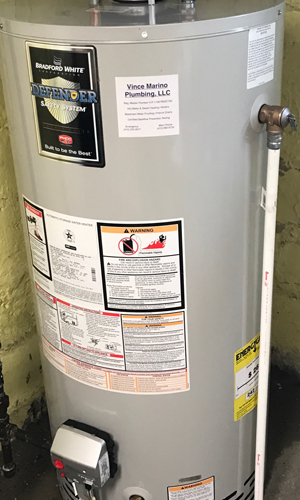Are you considering having your old tank-type water heater replaced with a tankless model? Before you go ahead with it, you need to know the consequences of going tankless. You’ll be surprised!
Tankless Water Heater
Also known as an instantaneous, on demand, or point of use water heater only provides a limited output of instant hot water to particular plumbing fixtures. It doesn’t store hot water like a conventional tank-type water heater you’re used to. For example, you wouldn’t be able to do a load of laundry, take a shower, and use the dishwasher all at the same time.
Tankless water heaters range in output amounts from 2.5 to 9.5 GPM (gallons per minute) depending on the model. A 40-gallon tank water heater, on the other hand, will deliver sixty-four gallons of hot water during its first hour of delivery (or when it is fully heated).
The difference between the two is a tank-type water heater delivers more volume of hot water, and the demand is satisfied better because there is no waiting.
How it works
This is how a tankless water heater works:
- The hot water side of a faucet is turned on.
- A flow sensor detects water flow.
- The ignition module ignites the burner.
- Cold water flows through the heat exchangers.
- The burner heats the cold water to a designated safe temperature (110 degrees.)
- Hot water is provided continuously until the faucet is closed.
Necessary accessories
A tankless water heater requires the following when its installed:
- scale shield filter
- isolator valve kit
- condensate neutralizer kit
All of these components listed will require routine maintenance and eventual replacement once they have expired. Especially the heater’s condensate filter which neutralizes the acidic condensate water it produces.
What are the benefits?
If you’re looking to gain space in your basement or garage so you can store more household items, a tankless water heater might be the right choice for you. But other than that you’re not going to gain anything else. And I’ll tell you exactly why shortly.
There are a couple good applications for a tankless heater besides using it to heat your hot water. And they are:
- space heating
- under floor radiant heating
For example, heating driveways for snow melting during winter, and heating interior floors such as ceramic bathroom tile and wood floors, all should be done with a tankless water heater.
Space heating using cast iron radiators or copper baseboard convectors can be heated from a tankless water heater as well. If you decide to use a tankless heater for hydronic heating only, there will be less maintenance because the heating system will be a closed system.
Is it worth it?
Read this calculation, and ask yourself is it worth it? You’ll realize that there is no energy savings gain at all from going tankless. And your return on the investment of installing one will take just about its entire life span. The annual maintenance alone to prevent limescale build-up in the heat exchanger will double the time to recoup your investment.
What kind of water heater do you want?
You can be confident Vince has the experience to recommend and install the right water heater to fit your needs. Contact Vince to set up a consultation.


